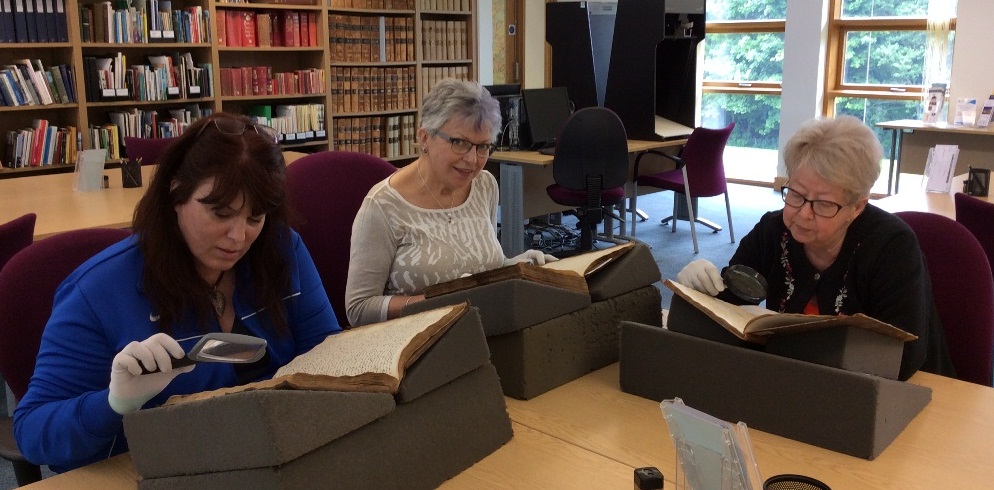 While visiting the High Life Highland Archive Service Centres and Museums you will have access to large collections of unique, irreplaceable and original documents and objects relating to the history of the area and its people. It is the aim of the High Life Highland Conservation Service to ensure that our county’s heritage is preserved for use by present and future generations.
While visiting the High Life Highland Archive Service Centres and Museums you will have access to large collections of unique, irreplaceable and original documents and objects relating to the history of the area and its people. It is the aim of the High Life Highland Conservation Service to ensure that our county’s heritage is preserved for use by present and future generations.
We provide physical access to documents and objects in our searchrooms. However, physical handling of original documents can be a significant and cumulative threat to their long term survival. The High Life Highland Archive Centres and Museums reading room facilities and practices are designed to minimise damage to these documents while they are handled, consulted or exhibited for visitors.
Access to the Unique Collections
Repeated handling of the documents can gradually reduce their natural life through poor inadequate handling. The most commonly used materials for old documents, such as paper, parchment and wax seals, inevitably and progressively deteriorate over time. We can, however, slow down this process very significantly by taking suitable precautions.
Staff Assistance
Staff are here to assist and guide you when handling physically awkward items – please ask for help. Old bound volumes are strained when opened flat, it is essential to make use of the book cushions, book wedges and weights even when it seems ‘too late’.
Handling with Gloves
Clean, dry hands are best for handling, this helps prevents natural oils in your hands from penetrating and staining the paper. Please don’t wet fingers to turn pages or run fingers along text to aid reading, use a sheet of paper instead. Gloves may be required for some items, especially photographs.
For Archival Documents and Records in Any Format
Please keep the documents in the order in which you received them.
Do not:
- Remove individual items from files, volumes or boxes.
- De-tag any file.
- Attempt to re-file the items in your preferred order.
- Put items on top of documents.
Do:
- Use the reading aids provided to ensure that documents are fully supported – documents should not hang off the edge of your desk or be held when read.
- Turn pages with care.
- Use a soft leaded pencil only.
- Use the pencil sharpeners provided.
Paper and Parchment Documents
- Remember that paper is highly vulnerable to damage from mishandling.
- Documents, un-mounted sheets should not be lifted by their corners alone.
- Never shuffle groups of documents, album pages, prints or drawings to align their edges, or pull an individual item from a pile without first removing all the items on top of it.
- Do not drag documents, manuscripts or books across the surface of any work beneath – lift it instead.
- Where possible, use archival enclosures, such as clear polyester pockets provided – to give some support to the item and protect it from direct contact with fingers.
- For larger-sized flat paper items, which require support, please ask a member of staff for assistance.
- Do not use staples, steel paper clips or plastic paper-clips on paper. These can cause impressions, rust stains and tears in paper.
Pendant Wax Seals
If a pendant wax seal is attached to the document, ensure that the seal is resting on a foam pad. When turning the document over, be sure to turn the seal at the same time.
Parchment Rolls
When scrolling through the document, re-roll it as it is read. Use weights to hold the roll in place.
Photographic Material
- Never touch the surface of a photograph – the image layer will tarnish readily from contact with acids and grease from fingers.
- Keep the photograph(s) within their clear polyester pockets (If supplied) to protect them from direct contact with hands.
- Make sure there is enough clear table space for objects to be placed and worked on safely.
- Protect from light and dust.
Books
- Remember that books are complex structures that are easily damaged by mishandling.
- Remove the required book from a shelf by pushing the volumes at either side slightly inwards then pull out the required book by holding the partly exposed sides.
- A book cradle, provided in the search room, should be used to support an archival book when it is being consulted.
- Do not open books flat on a table.
- Open a book by sections, to avoid excessive flicking through pages.
- Turn each page from the top outer corner – not from the bottom, turn the pages carefully.
- Do not place an open book face down.
- Do not stack open books.
- Never allow a book to stand on its fore edge, during consultation – the text block will eventually sag and possibly come away from the book spine.
- Use both hands when handling books, particularly when carrying over-size volumes.
- Do not carry volumes by the straps; carry these volumes flat using both hands.
- Heavy books should be laid on their sides – but not stacked.
- If a book is too heavy please ask a colleague for assistance.
